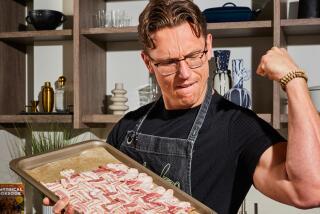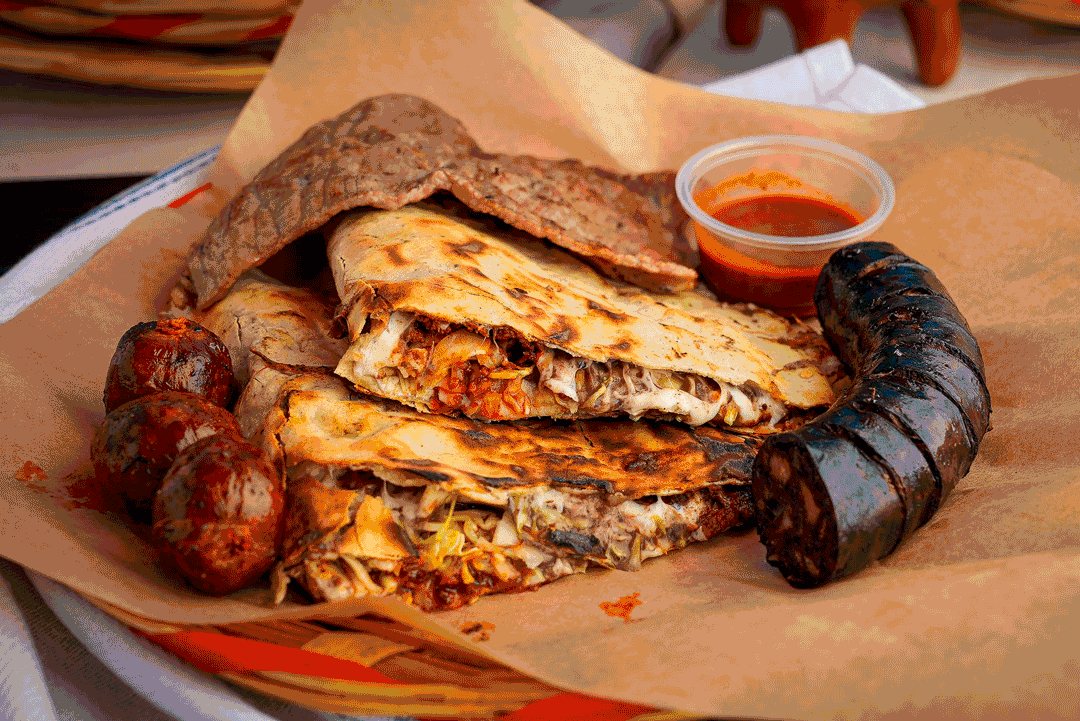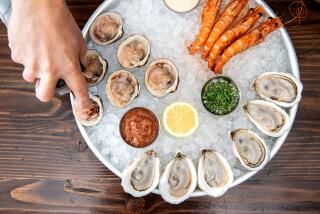HEALTH : Hospital Dishes Up First-Class Cuisine : Queen of the Valley chef David Koscher turns around the notion that food for patients has to be boring and bland.
- Share via
A typical dinner might include Chicken Monterey, a tender sauteed chicken breast served with Monterey Jack cheese sauce and a slice of creamy avocado. Or the main course could be succulent baked pork chop bathed in herb seasoning.
For the weight-conscious, there’s the golden-baked chicken or the baked ham, both served with garden fresh vegetables or oven-browned potatoes. And, of course, all meals come with a variety of appetizers, such as sliced tomatoes, cucumber salad or vegetable soup. For dessert, fresh strawberry and lemon cake, sherbet or chilled cherries.
Such is the unlikely bill of fare at the Queen of the Valley Hospital in West Covina, where staff and patients alike are treated daily to first-class cuisine created and prepared by master chef David Koscher.
“No one can compare with some of the things he can create,” said hospital spokeswoman Theresa McKweeney.
Koscher was recently named Corporate Chef of the Year by a panel of his peers, an honor that comes as no surprise to his boss and colleagues, who have been enjoying Koscher’s cooking for nearly four years.
“Hospital food is one aspect of health care that has been neglected,” said Koscher’s boss, David Zavala, director of food and nutrition services for the hospital. “It’s traditionally been thought of as bland and boring, but a chef of David’s caliber brings an excitement and a new level of quality to it.”
Along with the chef of the year honor, Koscher, 40, won a gold medal for culinary achievement at the Sodexho USA Chef’s Winner Circle competition, held Oct. 6 in Boston. Sodexho provides food services for 500 corporate, educational and health care institutions nationwide, including Queen of the Valley.
In the Sodexho meet, Koscher competed against 25 chefs from around the country. He won the medal in the salad category for his poached salmon salad and chive vinaigrette. The recipe was judged tops in creativity, presentation, texture and nutritional balance by four non-competing chefs from the Boston metropolitan area.
Koscher says cooking comes easily, primarily because he asks himself one simple question before preparing any dish: “Would I serve this to my mother if she was in the hospital?”
“For a lot of people who are sick and in the hospital, they wait for their three meals. It’s their whole life,” Koscher said.
“I put on my own little touches. . . . The herbal seasonings. The different blends. Our recipes are innovative. We are constantly redoing our menus,” he said.
*
After training at the Culinary Institute of America in New York, Koscher went to work in Florida for a hotel chain, specializing in banquets. He then went into business briefly for himself by opening a restaurant in Miami. Koscher moved to California in 1988 and worked for Food Dimensions Inc., an international food service, before moving on to Queen of the Valley Hospital.
In some cases, Koscher acknowledges, there’s not much even he can do to spice up a bland diet. So he shifts gears. Rather than jazzing up the flavor, he spruces up the presentation. For instance, instead of serving a piece of cooked chicken, he makes it look as though it’s been grilled. With potatoes, he fluffs them up duchess style rather than serve a pile of white mushy stuff.
*
“It used to be you would open a can and dish it out,” said Koscher, who supervises the preparation of about 200 breakfasts, lunches and dinners each day for patients and an additional 65 hot lunches for the Meals on Wheels program in La Puente. He also is in charge of meals for the hospital cafeteria for staff members and visitors.
“Today, 95% of the meals served in the cafeteria are made from scratch, as opposed to five or 10 years ago when everything was frozen or out of cans. That’s not what we do here.”
Not only does Koscher treat visitors and hospital staff to various ethnic dishes throughout the week, he makes his own ice cream, said hospital employee Catherine Koetters.
“He’s really a prize,” Koetters said. “He helps keep morale really high. In my opinion, this is restaurant-quality food. It’s nice to work in a place where you can expect something different every day in the cafeteria.”


